- Home
- Terry Brooks
The Elf Queen of Shannara Page 13
The Elf Queen of Shannara Read online
Page 13
“Phfft. I can wait at the—hrwwll—river,” Stresa growled. “I’ve done what I promised in any case.”
Wren ignored him. She kept her gaze fixed on the Owl. “It is not safe out here,” she insisted.
“It is not safe anywhere,” the other replied sadly. “Stresa and Faun are used to looking after themselves. And your friend Garth seems fit enough. A day or two, Wren—that would be all. By then, perhaps you can persuade the Council to let them come inside. Or you can leave and rejoin them.”
Wren didn’t know what sort of Council he was talking about, but irrespective of what was decided about Stresa and Faun she was not going to leave Garth. The Splinterscat and the Tree Squeak might be able to survive on their own, but this island was as foreign and treacherous for Garth as it was for her and she was not about to abandon him.
“There has to be another . . .” she started to say.
And suddenly there was a shriek and a wave of multilimbed things came swarming out of the mist. Wren barely had time to look up before they were upon her. She caught a glimpse of Faun streaking into the night, of Stresa’s quilled body flexing, and of Garth as he rose to defend her, and then she was knocked flying. She got her sword up in time to cut at the closest attacker. Blood flew and the creature tumbled away. There were bodies everywhere, crooked and black, bounding about as they ripped and tore at the members of the little company. Stresa’s quills flew into one and sent it shrieking away. Garth threw back another and battled to her side. She stood back to back with him and fought as the things came at them. She couldn’t see them clearly, only glimpses of their misshapen bodies and the gleaming eyes. She looked for the Owl, but he was nowhere to be found.
Then abruptly she caught sight of him, a shadow rising from the earth as he cut two of the attackers down before they knew what was happening. In the next instant he was gone again, then back at another place, a pair of long knives in his hands, though Wren couldn’t remember having seen any weapons on him before. The Elf was like smoke as he slipped among the attackers, there and gone again before you could get a fix on him.
Garth pressed forward, his massive arms flinging the attackers aside. The demons held their ground momentarily, then fell back, bounding away to regroup. Howls rose out of the darkness all about.
Aurin Striate materialized at Wren’s side. His words were harsh, urgent. “Quick. This way, all of you. We’ll worry about the Council later.”
He took them across the stretch of lava rock and back into the ravine. Sounds of pursuit came from everywhere. They ran in a low crouch along the rocky basin, angling through boulders and cuts, the Owl leading, a phantom that threatened at every turn to disappear into the night.
They had gone only a short distance when something small and furry flung itself onto Wren’s shoulder. She gasped, reeled away protectively, then straightened as she realized it was Faun, returned from wherever she had run off to. The Tree Squeak burrowed into her shoulder, chittering softly.
Seconds later the demons caught up with them, swarming out of the haze once more. They swept past Stresa, who curled into a ball instantly, quills pointing every which way, and flung themselves on the humans. Garth took the brunt of the attack, a wall that refused to buckle as he flung the creatures back one after another. Wren fought next to him, quick and agile, the blade of the short sword flicking left and right.
Against her chest, nestled in their leather bag, the Elfstones began to burn.
Again the attackers drew back, but not so far this time and not so readily. The night and the fog turned them to shadows, but their howls were close and anxious as they waited for others to join them. The Elf and his charges gathered in a knot, fighting for breath, their weapons glistening damply.
“We have to keep running,” the Owl insisted. “It is not far now.”
A dozen feet away, Stresa uncurled, hissing. “Ssssttppht! Run if you must, but this is enough for me! Phhfft!” He swung his cat head toward Wren. “I’ll be waiting—rwwwll—Wren when you return. At the river I’ll be. Don’t forget your promise!”
Then abruptly he was gone, slipping away into the dark, having become one of the shadows about him.
The Owl beckoned, and Wren and Garth began to run once again, still following the curve of the ravine. There was movement all about them in the mist, swift and furtive. Jets of steam gushed from the earth through cracks in the lava, and the stench of sulfur filled the air. A slide of rocks blocked their way, and they scrambled past it hurriedly. Ahead, Arborlon glowed behind its protective wall, a shimmer of buildings and towers amid forest trees. In the mixed light of the city’s magic and the volcano’s fire, Killeshan’s barren, ravaged slope was dotted with islands of scrub and trees that had somehow escaped the initial devastation and were now reduced to a slow suffocation from the heat. Vog hung across the landscape in a ragged curtain, and the monsters that hid within it passed through its ashen haze like bore worms through earth.
A depression lay ahead, a continuation of the ravine they had been following. The Owl had them hurrying toward it when the demons attacked again. They flew at them from both sides this time, materializing out of the gloom as if risen from the earth. The Owl was knocked sprawling, and Wren went down in a flurry of claws and teeth. Only Garth remained standing, and there were demons all over him, clinging, tearing, trying to bring him down. Wren kicked out violently and freed herself. Faun had already disappeared, quick as a thought, back into the night. Wren’s sword slashed blindly, cut into something, held momentarily, then jerked free. She scrambled up and was borne back again, hammered against the rock. She could feel gashes open on the back of her head and neck. Pain brought tears to her eyes. She rolled clear and came to her feet, demons circling all about. Night and mist had swallowed up the Owl. Garth was down, the demons atop him a writhing mass of black limbs. She screamed and struggled to reach him, but crooked hands clutched roughly at her and held her back.
The Elfstones seared her chest like fire.
Burdened by the weight of her attackers, she began to fall. She knew instinctively that this time she would not be able to get back up, that this was the end for all of them.
She could hear herself scream soundlessly somewhere deep inside.
Reason fled before her need, and fear gave way to rage. There were bodies all about her, claws and teeth ripping, and fetid breath against her skin. Her fingers plunged into her tunic and yanked the Stones free.
They flared to life instantly, an eruption of light and fire. The leather bag disintegrated. The magic exploded through cracks in the Rover girl’s fingers, too impatient and too willful to wait for her hand to open. It swept the air like a scattering of knives, cutting apart the black things, turning them to dust almost before their screams died away. Wren was suddenly free again. She stumbled to her feet, with the Elfstones stretched forth now, the fire and the light racing from within her, joining with the magic until there was no distinction. She threw back her head as the power ripped through her—harsh, defiant, and exhilarating. She was transformed, and her fears of what would become of her in the wake of the magic’s use dissipated and were lost. It made no difference who or what she had been or how she had lived her life. The magic was everything. The magic was all that mattered.
She turned its power on the mass of bodies atop Garth and it hammered into them. In seconds, they disintegrated. Some withstood the fury of the attack a few moments longer than the others—those that were larger and more hardened—but in the end they all died. Garth rose, bloodied, his clothes in tatters, and his dark, bearded face ashen. What was he staring at? she wondered vaguely. She marveled at the look on his face as she used the power of the Stones to sweep the landscape clean. The Owl reappeared out of the haze, and there was awe etched on his leathery face as well. And fear. They were both so afraid . . .
Suddenly she understood. She closed her fingers in shock, and the magic was gone. The exhilaration and the fire left her, draining away in an instant, and it was as if
she had been stripped naked and set out for everyone to see. Weariness flooded through her. She felt ashamed. The magic had snared her, taken her for its own, destroyed her resolution to withstand its lure, and buried all her promises that she would not give way to it, that she would not become another of the Ohmsfords it had claimed.
Ah, but she had needed its power, hadn’t she? Hadn’t it kept her alive—kept them all alive? Hadn’t she wanted it, even gloried in it? What else could she have done?
Garth was next to her, holding her by the shoulders, keeping her upright, his dark eyes intense as he looked into her own. She nodded vaguely that she was aware of him, that she was all right. But she wasn’t, of course. The Owl was there as well, saying, “Wren, you are the one that she has waited for, the one who was promised. You are welcome indeed. Come quickly now, before the dark things regroup and attack again. Hurry!”
She followed obediently, wordlessly, her body a foreign thing that swept her along as she watched from somewhere just without. Heat and exhaustion worked through her, but she felt detached from them. She saw the landscape revert to a sea of vog through which a strange array of shadows floated. Trees lifted skyward in clusters, leafless and bare, brittle stalks waiting to crumble away. Ahead, glistening like something trapped behind a rain-streaked window, was the city of the Elves, a jeweled treasure that shimmered with promise and hope.
A lie, the thought struck her suddenly, incongruously, and she was surprised with the intensity of it. It is all a lie.
Then the Owl led them through a tangle of brush and down a narrow defile where the shadows were so thick it was all but impossible to see. He crouched down, worked at a gathering of rocks, and a trapdoor lifted. Swiftly they scrambled inside, the air hot and stifling. The Elf reached up and pulled the trapdoor back into place and secured it. The darkness lasted only a moment, and then there was a hint of the city’s strange light through the tunnel that lay ahead. The Owl took them down its length, saying nothing, lean and shadowy against the faint wash of brightness. Wren felt the sense of detachment fading now; she was back inside herself, returned to who and what she was. She knew what had happened, what she had done, but she would not let herself dwell on it. There was nothing to do but to go forward and to complete the journey she had set herself. The city lay ahead—Arborlon. And the Elves, whom she had come to find. That was what she must concentrate on.
She realized suddenly that Faun had not come back to her. The Tree Squeak was still outside, fled into that fiery netherworld . . . She shut her eyes momentarily. Stresa was there as well, gone of his own choice. She feared for them both. But there was nothing she could do.
They worked their way down the tunnel for what seemed an endless amount of time, crouched low in the narrow passageway, wordless as they went. The light brightened the farther they went until it was as clear as daylight within the rock. The world without faded entirely—the vog, the heat, the ash, and the stench—all gone. Suddenly the rock disappeared as well, turning abruptly to earth, black and rich, a reminder for Wren of the forests of the Westland, of her home. She breathed the smell in deeply, wondering that it could be. The magic, she thought, had preserved it.
The tunnel ended at a set of stone stairs that led upward to a heavy, iron-bound door set in a wall of rock. As they reached the door, the Owl turned suddenly to face them.
“Wren,” he said softly, “listen to me.” The gray eyes were intense. “I know I am a stranger to you, and you have no particular reason to trust anything I say. But you must rely on me at least this once. Until you speak with the queen, and only when you are alone with her, should you reveal that you have possession of the Elfstones. Tell no one else before. Do you understand?”
Wren nodded slowly. “Why do you ask this of me, Aurin Striate?”
The Owl smiled sadly, the creases in his worn face deepening. “Because, Wren, though I would wish it otherwise, not everyone will welcome your coming.”
Then, turning, he tapped sharply on the door, waited, and tapped again—three and then two, three and then two. Wren listened. There was movement on the other side. Heavy locks released, sliding free.
Slowly the door swung open, and they stepped through.
X
Ihave come home.
It was Wren’s first thought—vivid, startling, and unexpected.
She was inside the city walls, standing in an alcove that opened beneath the shadow of the parapets. Arborlon stretched away before her, and it was as if she had returned to the Westland, for there were oaks, hickories and elm, green bushes and grass, and earth that smelled of growing things and changes of season, streams and ponds, and life at every turn. An owl hooted softly, and there was a flutter of wings close at hand as a smaller bird darted away from its hidden perch. Some others sang. Whippoorwills! Fireflies glimmered in a stand of hemlock and crickets chirped. She could hear the soft rush of water from a river where it tumbled over the rocks. She could feel the whisper of a gentle night wind against her cheek. The air smelled clean, free of the stench of sulfur.
And there was the city itself. It nestled within the greenery—clusters of homes and shops, streets and roadways below and skypaths overhead, wooden bridges that connected across the tangle of streams, lamps that lit windows and flickered in welcome, and people—a handful not yet gone to sleep—walking perhaps to ease their restlessness or to marvel at the sky. For there was sky again, clear and cloudless, brilliant with stars and a three-quarter moon as white as new snow. Beneath its canopy, everything glimmered faintly with the magic that emanated from the walls. Yet the glow was not harsh as it had seemed to Wren from without, and the walls, despite their height and thickness, were so softened by it that they appeared almost ephemeral.
Wren’s eyes darted from place to place, finding flower gardens set out in well-tended yards, hedgerows that lined walkways, and street lamps of intricately wrought iron. There were horses, cows, chickens, and animals of all sorts in pens and barns. There were dogs curled up asleep in doorways and cats on sills. There were colored flags and umbrellas astride entries and awnings hung from shop fronts and barter carts. The houses and shops were white and clean, edged with fresh-painted borders in a myriad of colors. She could not see it all, of course, only the closest parts of the city. Yet there was no mistaking where she was or how it made her feel.
Home.
Yet as quickly as the pleasing rush of familiarity and sense of belonging swept over her, it disappeared. How could she come home to a place she had never been, had never seen, and hadn’t even been certain existed until this moment?
The vision blurred then and seemed to shrink back into the night’s shadows as if seeking to hide. She saw what she had missed before—or perhaps simply what she had not allowed herself to see in her excitement. The walls teemed with men, Elves in battle dress with weapons in band, their lines of defense stretched across the battlements. An attack was under way. The struggle was oddly silent, as if the magic’s glow somehow muffled the sounds. Men fell, some to rise again, and some to disappear. The shadows that attacked suffered casualties as well, some burned by the light that sparked and fizzled as a dying fire might, and some cut down by the defenders. Wren blinked. Within the walls, the city of the Elves seemed somehow less bright and more worn. The houses and shops were a little darker, a little less carefully tended than she bad first imagined, the trees and bushes not as lush, and the flowers paler. The air she breathed was not so clean after all—there was a hint of sulfur and ash. Beyond the city, Killeshan loomed dark and threatening, and its mouth glowed blood-red against the night.
She was aware suddenly of the Elfstones still clenched tightly in her hand. Without looking down at them, she slipped them into her pocket.
“Come this way, Wren,” Aurin Striate said.
There were guards at the door through which they had entered, bard-faced young men with distinctly Elven features and eyes that seemed tired and old. Wren glanced at them as she passed and was chilled by the way they
stared back at her. Garth edged close against her shoulder and blocked their view.
The Owl took them out from beneath the parapets and over a rampway bridging a moat that encircled the city inside its walls. Wren looked back, squinting against the light. There was no water in the moat; there seemed to be no purpose in having dug it. Yet it was clearly meant to be some sort of defense for the city, bridged at dozens of points by ramps that led to the walls. Wren glanced questioningly at Garth, but the big man shook his head.
A roadway opened through the trees before them, winding ahead into the center of the city. They started down it, but had gone only a short distance when a large company of soldiers hurried past, led by a man with hair so sun-bleached it was almost white. The Owl pulled Wren and Garth aside into the shadows, and the man went past without seeing them.
“Phaeton,” the Owl said, looking after him. “The queen’s anointed on the field of battle, her savior against the dark things.” He said it ironically, without smiling. “An Elven Hunter’s worst nightmare.”
They went on wordlessly, turning off the roadway to follow a series of side streets that took them through rows of darkened shops and cottages. Wren glanced about curiously, studying, considering, taking everything in. Much was as she had imagined it would be, for Arborlon was not so different, apart from its size, from Southland villages like Shady Vale—and except, of course, for the continuing presence of the protective wall, still a shimmer in the distance, a reminder of the struggle being waged. When, after a time, the glow disappeared behind a screen of trees, it was possible to think of the city as it must have once been, before the demons, before the beginning of the siege. It would have been wonderful to live here then, Wren thought, the city forested and secluded as it had been above the Rill Song, reborn out of its Westland beginnings into this island paradise, its people with a chance to begin life anew, free of the threat of oppression by the Federation. No demons then, Killeshan dormant, and Morrowindl at peace—a dream come out of imagining.

 The Talismans of Shannara
The Talismans of Shannara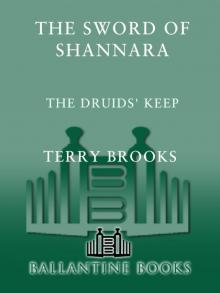 The Sword of Shannara: The Druids' Keep: The Druids' Keep
The Sword of Shannara: The Druids' Keep: The Druids' Keep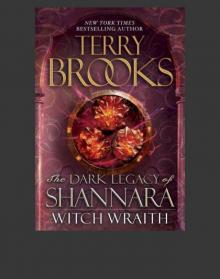 Witch Wraith
Witch Wraith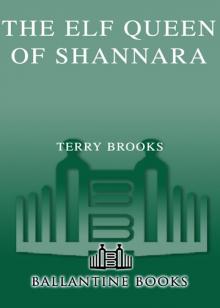 The Elf Queen of Shannara
The Elf Queen of Shannara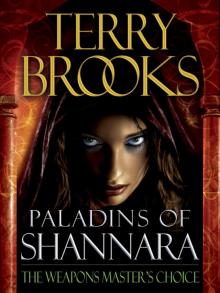 The Weapons Master's Choice
The Weapons Master's Choice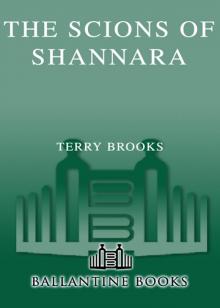 The Scions of Shannara
The Scions of Shannara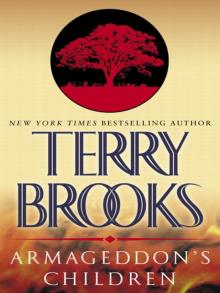 Armageddon's Children
Armageddon's Children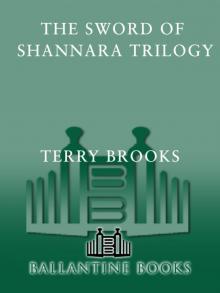 The Sword of Shannara Trilogy the Sword of Shannara Trilogy
The Sword of Shannara Trilogy the Sword of Shannara Trilogy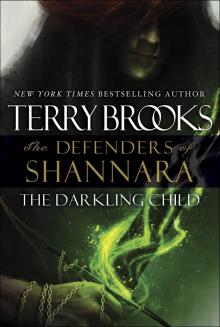 The Darkling Child
The Darkling Child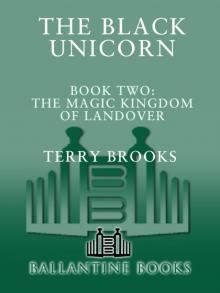 The Black Unicorn
The Black Unicorn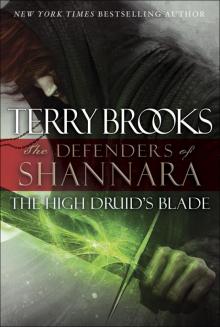 The High Druid's Blade
The High Druid's Blade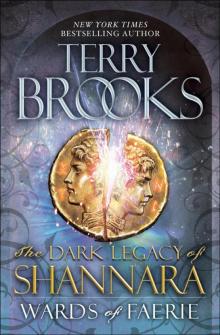 Wards of Faerie
Wards of Faerie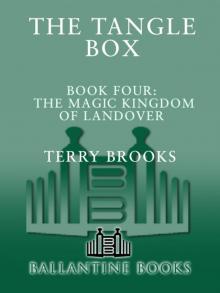 The Tangle Box
The Tangle Box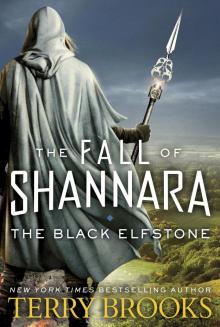 The Black Elfstone
The Black Elfstone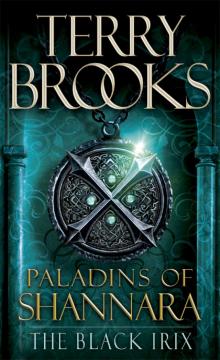 The Black Irix
The Black Irix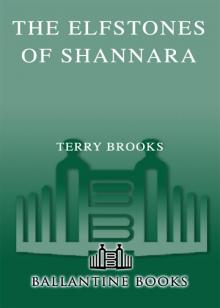 The Elfstones of Shannara
The Elfstones of Shannara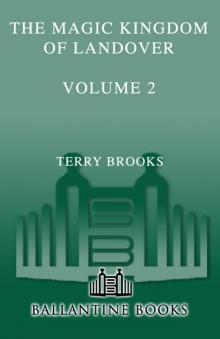 The Magic Kingdom of Landover Volume 2
The Magic Kingdom of Landover Volume 2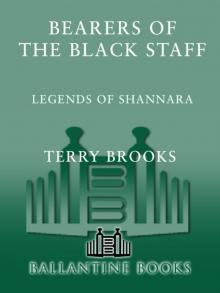 Bearers of the Black Staff
Bearers of the Black Staff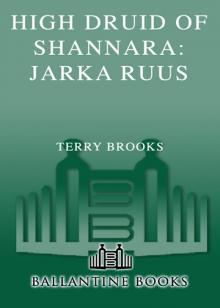 Jarka Ruus
Jarka Ruus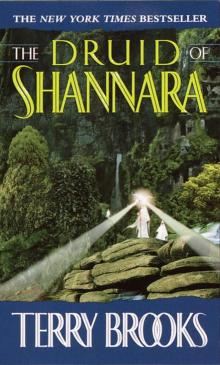 The Druid of Shannara
The Druid of Shannara The Sword of Shannara
The Sword of Shannara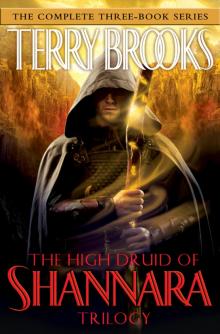 The High Druid of Shannara Trilogy
The High Druid of Shannara Trilogy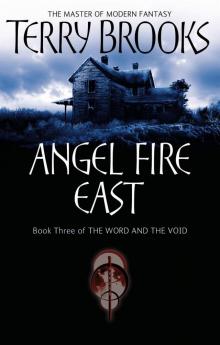 Angel Fire East
Angel Fire East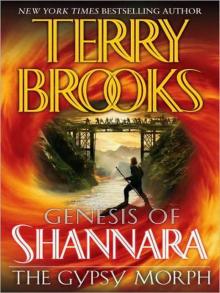 The Gypsy Morph
The Gypsy Morph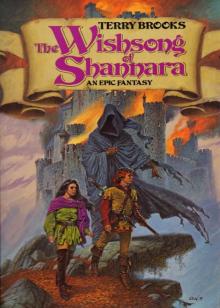 The Wishsong of Shannara
The Wishsong of Shannara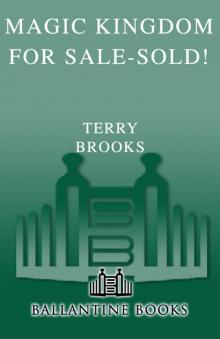 Magic Kingdom for Sale--Sold
Magic Kingdom for Sale--Sold Running With the Demon
Running With the Demon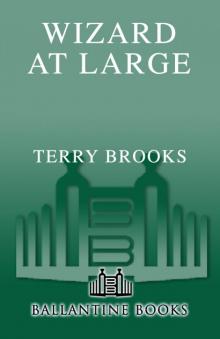 Wizard at Large
Wizard at Large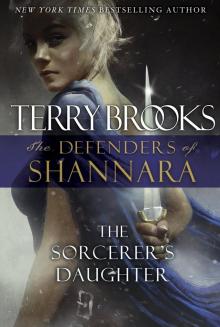 The Sorcerer's Daughter
The Sorcerer's Daughter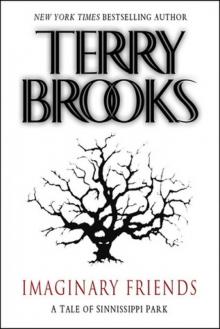 Imaginary Friends
Imaginary Friends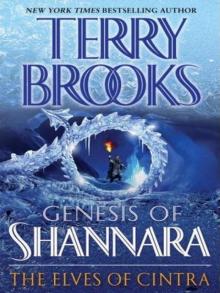 The Elves of Cintra
The Elves of Cintra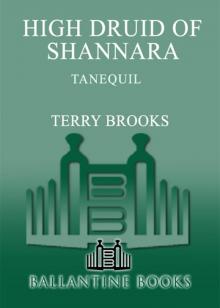 Tanequil
Tanequil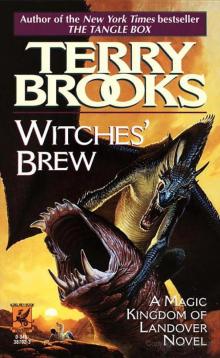 Witches' Brew
Witches' Brew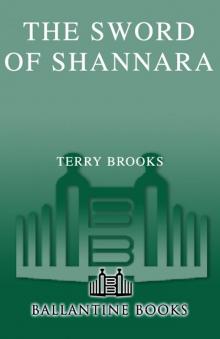 The Sword of the Shannara and the Elfstones of Shannara
The Sword of the Shannara and the Elfstones of Shannara The World of Shannara
The World of Shannara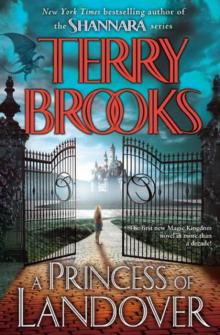 A Princess of Landover
A Princess of Landover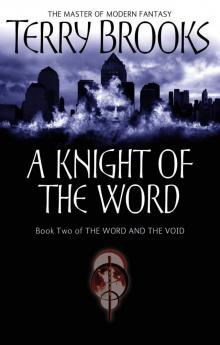 A Knight of the Word
A Knight of the Word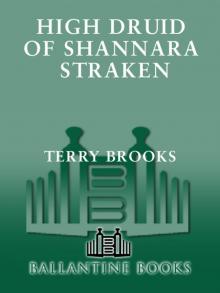 Straken
Straken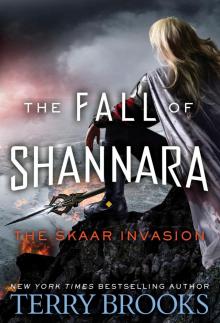 The Skaar Invasion
The Skaar Invasion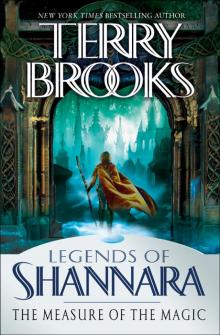 The Measure of the Magic: Legends of Shannara
The Measure of the Magic: Legends of Shannara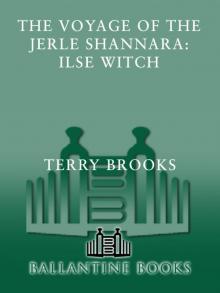 Ilse Witch
Ilse Witch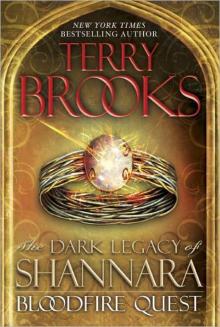 Bloodfire Quest
Bloodfire Quest The Stiehl Assassin
The Stiehl Assassin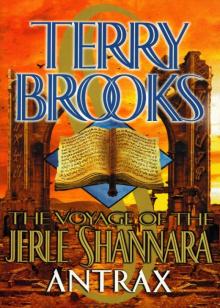 Antrax
Antrax The Last Druid
The Last Druid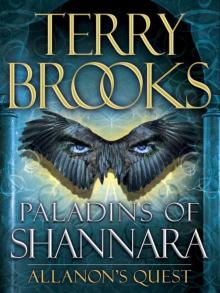 Paladins of Shannara: Allanon's Quest
Paladins of Shannara: Allanon's Quest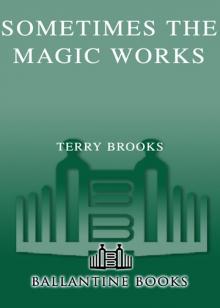 Sometimes the Magic Works: Lessons From a Writing Life
Sometimes the Magic Works: Lessons From a Writing Life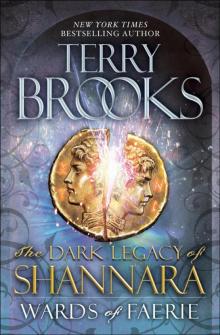 Wards of Faerie: The Dark Legacy of Shannara
Wards of Faerie: The Dark Legacy of Shannara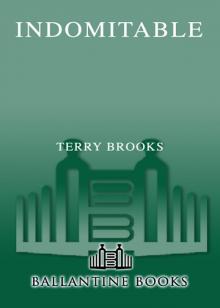 Indomitable: The Epilogue to The Wishsong of Shannara
Indomitable: The Epilogue to The Wishsong of Shannara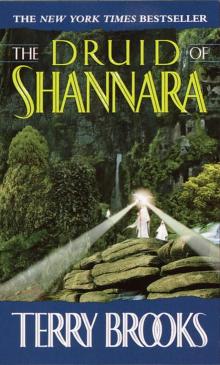 Heritage of Shannara 01 - The Druid of Shannara
Heritage of Shannara 01 - The Druid of Shannara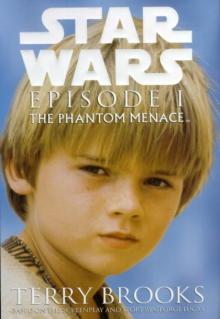 Star Wars - Phantom Menace
Star Wars - Phantom Menace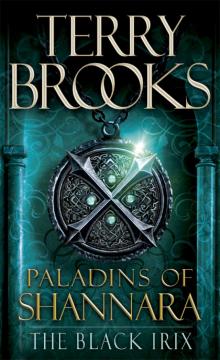 The Dark Legacy of Shannara Trilogy 3-Book Bundle
The Dark Legacy of Shannara Trilogy 3-Book Bundle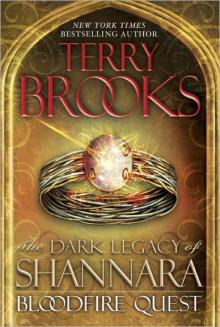 The Bloodfire Quest
The Bloodfire Quest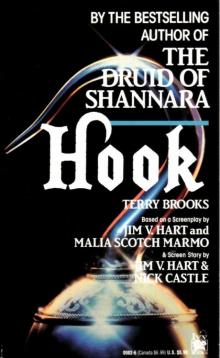 The Hook (1991)
The Hook (1991) Star Wars: Episode I: The Phantom Menace
Star Wars: Episode I: The Phantom Menace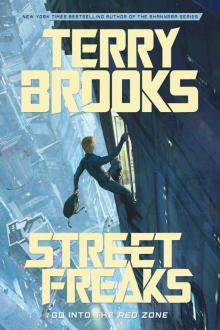 Street Freaks
Street Freaks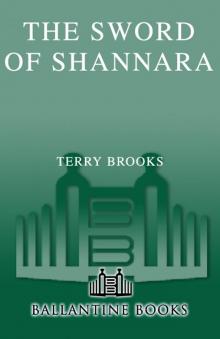 The Sword of Shannara & Elfstones of Shannara
The Sword of Shannara & Elfstones of Shannara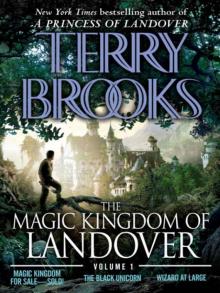 The Magic Kingdom of Landover , Volume 1
The Magic Kingdom of Landover , Volume 1 The Phantom Menace
The Phantom Menace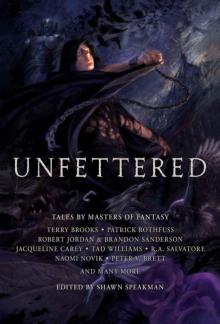 Unfettered
Unfettered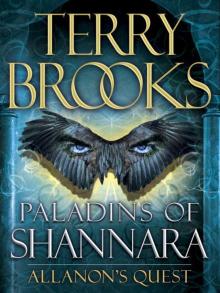 Allanon's Quest
Allanon's Quest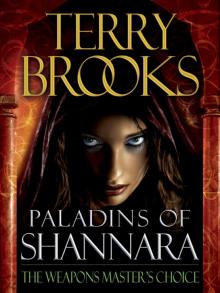 Paladins of Shannara: The Weapons Master's Choice
Paladins of Shannara: The Weapons Master's Choice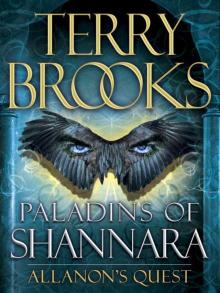 Terry Brooks - Paladins of Shannara - Allanon's Quest (Short Story)
Terry Brooks - Paladins of Shannara - Allanon's Quest (Short Story) Star Wars Episode I: The Phantom Menace (star wars)
Star Wars Episode I: The Phantom Menace (star wars)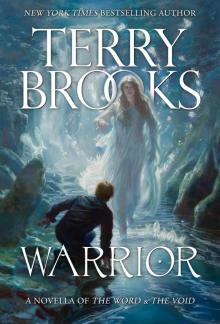 Warrior (The Word and the Void)
Warrior (The Word and the Void)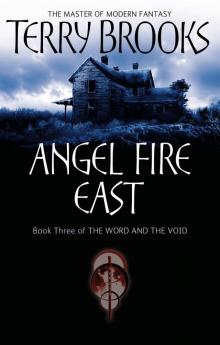 Word & Void 03 - Angel Fire East
Word & Void 03 - Angel Fire East![[Magic Kingdom of Landover 05] - Witches' Brew Read online](http://i1.bookreadfree.com/i2/04/05/magic_kingdom_of_landover_05_-_witches_brew_preview.jpg) [Magic Kingdom of Landover 05] - Witches' Brew
[Magic Kingdom of Landover 05] - Witches' Brew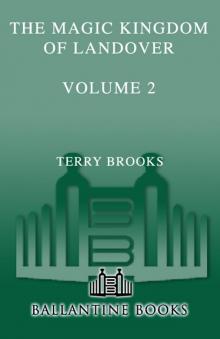 The Magic Kingdom of Landover - Volume 2
The Magic Kingdom of Landover - Volume 2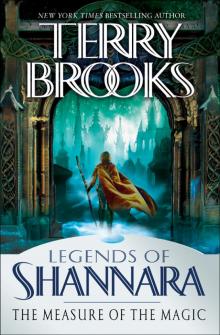 The Measure of the Magic
The Measure of the Magic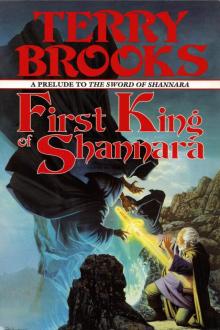 The First King of Shannara
The First King of Shannara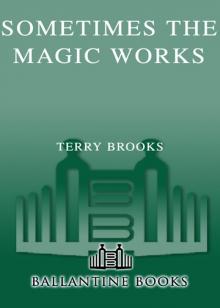 Sometimes the Magic Works
Sometimes the Magic Works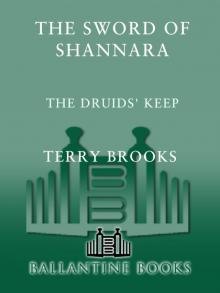 The Sword of Shannara, Part 2: The Druids' Keep
The Sword of Shannara, Part 2: The Druids' Keep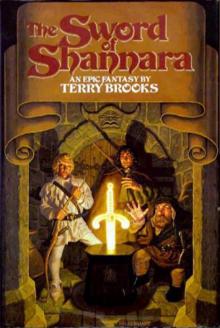 The Sword of Shannara tost-1
The Sword of Shannara tost-1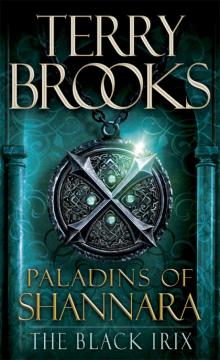 Paladins of Shannara: The Black Irix (Short Story)
Paladins of Shannara: The Black Irix (Short Story)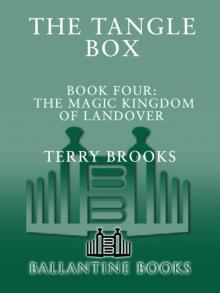 Tangle Box
Tangle Box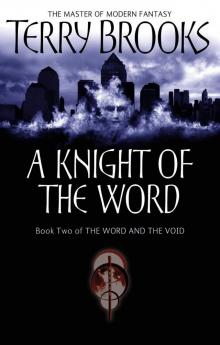 Word & Void 02 - A Knight of the Word
Word & Void 02 - A Knight of the Word The Sword of Shannara, Part 1: In the Shadow of the Warlock Lord
The Sword of Shannara, Part 1: In the Shadow of the Warlock Lord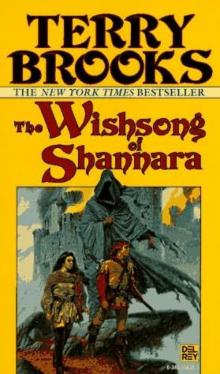 The Wishsong of Shannara tost-3
The Wishsong of Shannara tost-3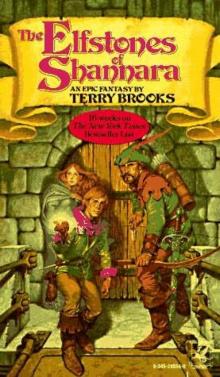 The Elfstones of Shannara tost-2
The Elfstones of Shannara tost-2